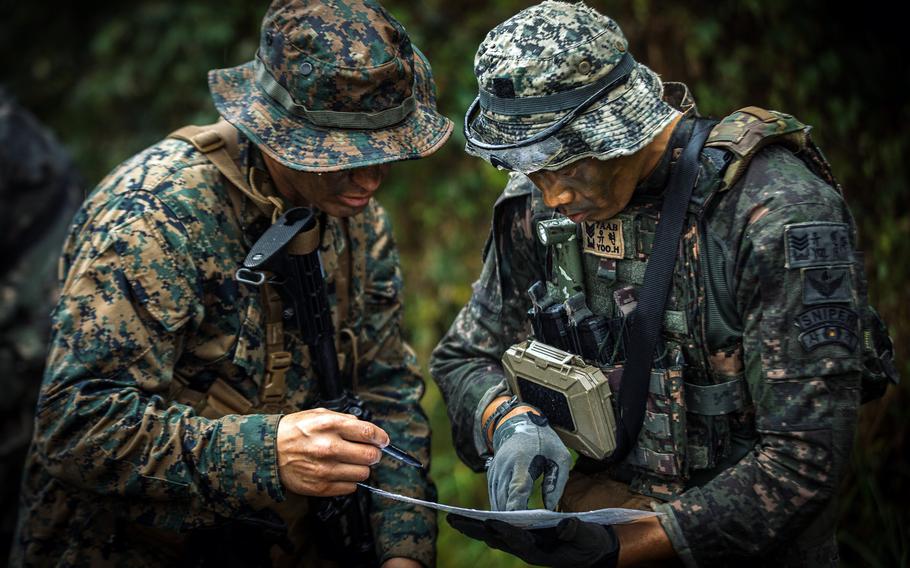
U.S. and South Korean soldiers and marines carry out a land navigation exercise in South Korea, Oct. 22, 2024. (Eric Kestner/U.S. Army)
CAMP HUMPHREYS, South Korea — The 71-year military alliance between South Korea and the United States won’t be affected by the political turmoil in Seoul even if President Yoon Suk Yeol is impeached this weekend, according to experts.
The country’s National Assembly is scheduled Saturday to vote a second time to suspend Yoon from office, 11 days after he abruptly enacted martial law and deployed South Korean soldiers to prevent lawmakers from voting to end his declaration. The assembly nonetheless managed to force an end to Yoon’s late night decree after six hours.
Despite “a high level of uncertainty” in its political arena, South Korea’s close relationship with the U.S. will continue, Hahm Sung Deuk, the dean of Kyonggi University’s Graduate School of Political Studies based in Seoul, said by phone Friday.
“Regardless of our ideology, liberal or conservative, we know that the relationship between the U.S. and South Korea is so important, so critical to survive in our democracy,” he said. “So regardless of who is in power, regardless of what kind of impeachment process we are confronted with, we all realize the importance of the relationship between the U.S. and South Korea.”
The move to impeach Yoon — the first attempt failed Dec. 7 when Yoon’s own People Power Party lawmakers boycotted the vote — has attracted disaffected People Power members, including party leader Han Dong-hoon. He urged his fellow lawmakers Thursday to vote for impeachment to “protect the democratic republic.”
A vote by at least 200 of the 300-member National Assembly is required to impeach Yoon. If the measure passes, South Korean Prime Minister Han Duck-soo will serve in the interim while the Constitutional Court examines whether Yoon should be reinstated or removed permanently from office, a process that can take up to six months.
Hahm said the U.S. military alliance is the “essence” of the relationship between the two countries, as evidenced by the Iraq War. South Korean President Roh Moo-hyun of the liberal Uri Party deployed roughly 3,500 troops there to support the U.S.-led coalition in 2004.
“We have our democratic procedures and institutions set up, so it’ll take a little time, but we’ll solve this problem peacefully,” Hahm said.
Retired South Korean army Lt. Gen. Chun In-Bum, the former head of the country’s Special Warfare Command, said “the damage has already been done” by Yoon’s martial law declaration and that he expects the military will continue operating as normal.
South Korea’s military “has always been able to go about its business,” as demonstrated during the 2017 impeachment of then-President Park Geun-hye, Chun said by phone Friday.
Park was removed and imprisoned for nearly five years on charges of abuse of power and bribery.
“If you look very closely, the democratic government system that we have is working,” Chun said. “The chain of command is still there.”
Park Jae Jeok, an associate professor at the Seoul-based Yonsei University, said relations with the U.S. may be “business as usual” for now, but a potential Democratic Party successor to Yoon could prompt broader changes.
A liberal South Korean president will likely “draw back” Yoon’s efforts to expand Seoul’s contributions to regional security alongside the U.S., and become reluctant to join in multinational maritime exercises, particularly in the West Philippine Sea, Park said by phone.
Army Gen. Paul LaCamera, commander of U.S. Forces Korea, agreed Thursday with interim South Korean Minister of National Defense Kim Sun-ho to continue joint military exercises and keep “all lines of communication open,” according to a USFK news release that day.
Kim’s predecessor, Kim Yong Hyung, resigned Dec. 4 after Yoon’s failed decree and is under arrest in Seoul.
“We remain prepared to respond to external threats while completely respecting [South Korea’s] sovereignty and individual rights,” LaCamera said in the release.